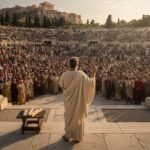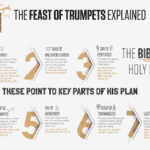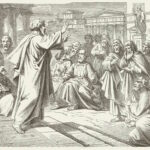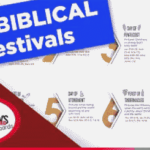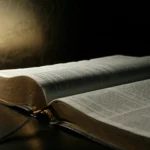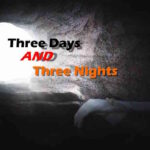Young men and boys in America are facing a growing crisis that has unfolded quietly for decades. The erosion of the nuclear family, the marginalization of masculine roles, and the decline of respect for elders have left many boys without clear purpose or strong male role models. Nowhere is this more evident than in the absence of fathers. According to the U.S. Census Bureau, nearly…
Ryan Welsh Profile
Story Submitted
Did Paul Teach Righteousness Without Law-Keeping? cbcg.org
Many believe Paul taught that Christians are made righteous apart from any obedience to God’s law—especially when reading Romans 3:20–21: “By the deeds of the law no flesh shall be justified… But now the righteousness of God without the law is manifested.” On the surface, it sounds as if Paul dismissed law-keeping altogether. But is that what he meant? A closer look at the Greek…
The Feast of Trumpets: A Warning and a Hope youtu.be
The Feast of Trumpets is the fourth step in God’s plan of salvation, commanded in Leviticus 23:24 as a “memorial of blowing of trumpets.” In Scripture, trumpets announced war and destruction (Numbers 10) and the coronation of a king (1 Kings 1:34). Both meanings reveal the prophetic purpose of this day. First, it points to the coming Day of the Lord – a year-long period…
The Ideal Man – Donald Winchester vision.org
Many today are legitimately anxious about the future. Young men in particular see their chances for success, power and influence slipping away.
Five Myths About Grace – Kendrick Diaz lifehopeandtruth.com
Grace is one of the most recognized concepts in the Bible, but it’s also one of the most misunderstood.
Will the Dead Live Again? – Richard F. Ames thebiblesaysthat.com
Are you worried about loved ones who died without knowing Christ? Are they lost forever in torment? The truth is far more hopeful—and far less understood – than most imagine. Many believe in an ever-burning hell because of tradition, not Scripture. Dante’s Inferno, not the Bible, shaped much of today’s imagery of hell. But your Bible says, “The wages of sin is death” (Romans 6:23)…
Pentecost and the Promise of the Father – John LaBissoniere ucg.org
Imagine if Jesus lived next door – healing, comforting, and guiding us instantly. Though He ascended to the Father long ago (John 16:28), He promised something even greater: the arrival of the Holy Spirit. At first, this seemed sorrowful to the disciples (John 16:6), but Jesus assured them it was for their benefit: “If I do not go away, the Helper will not come” (John…
Did Jesus Abolish the Seventh-day Sabbath? cbcg.org
In the Sermon on the Mount, Jesus affirmed that God’s commandments remain in force under the New Covenant “Therefore, whoever shall break one of these least commandments, and shall teach men so, shall be called least in the kingdom of [from] heaven; but whoever shall practice and teach them, this one shall be called great in the kingdom of heaven”(Matt. 5:19). Yet today, the Fourth…
Will Deceive Many (Part One) – Pat Higgins cgg.org
In Matthew 16:3, Jesus rebukes the Pharisees for recognizing weather signs but ignoring the “signs of the times.” Could we be making the same mistake? Our world is in rapid moral decline – corruption touches every institution. Jesus warned of days like these, comparing them to Noah’s time, when “all flesh had corrupted their way” (Genesis 6:12). As in Noah’s day, deception now defines our…
The Apostle Paul’s Teaching on Justification in the Book of Galatians cbcg.org
Many use Galatians 5:18 – “But if ye be led of the Spirit, ye are not under the law” – to argue that Christians are no longer required to keep God’s commandments. But this interpretation is based on poor translation and misunderstanding. The original Greek lacks the definite article “the,” meaning it should read, “not under law.” But what kind of law is Paul referring…
Were Holy Days the Heresy at Colosse? – Eddie Johnson lifehopeandtruth.com
Colossians 2:16-17 is often misunderstood as proof that Paul rejected biblical holy days and food laws. But a closer look reveals something different. Paul wrote to counter false teachings – especially early forms of gnosticism – that had infiltrated the Colossian church. Some gnostics, particularly the ascetic kind, weren’t rejecting holy days altogether. Instead, they were keeping them in harsh, self-denying ways and judging others…
God’s Seven Biblical Holy Days and Festivals youtu.be
God’s Plan in the Festivals: A Story of Family, Redemption, and Glory God has had a plan from the beginning. He created humanity with a purpose – not just to live and die, but to become part of His eternal family. This incredible truth is revealed in the life and teachings of Jesus Christ and pictured clearly through the seven annual festivals God established. These…
Resisting to Bloodshed – Jeremy Lallier sabbaththoughts.com
Resist the Shattering Here’s the bad news: Satan is out to get you. He wants to ruin your salvation, crush your spiritual potential, and leave you broken. But here’s the good news: He can’t – unless we let him. Jesus promises, “No one is able to snatch them out of My Father’s hand” (John 10:29). Our salvation is secure, but that doesn’t mean Satan stops…
“But Let a Man Examine Himself”: 10 Questions to Ask Before Passover – Jeremy Lallier sabbaththoughts.com
As Passover approaches, self-examination is vital—but if we’re not careful, it can quickly slide into self-condemnation. It’s easy to focus on how far we still have to go: the struggles, the shortcomings, the sense that we haven’t done enough. Growth matters. But when our eyes are fixed only on our flaws, we risk missing the very purpose of the season. Paul wrote that in taking…
Are Christians Once Saved, Always Saved? ucg.org
Some believe that once a person accepts Jesus Christ as Savior, their salvation is forever assured—often called “eternal security” or “once saved, always saved.” But does the Bible actually teach this? A common proof text is John 10:27-29, where Jesus says His sheep hear His voice and no one can snatch them from His or the Father’s hand. However, this speaks of external threats, not…
The Son Makes Us Free – Brian Orchard leadingtolife.org
The Hedgehog Review, an intellectual publication, explores deep philosophical and ethical questions. One article begins with the question: “How do we foster the conditions conducive to a truly enduring moral and ethical order?” Intellectuals seek this order, often examining Critical Theory from the Frankfurt School, including Theodore Adorno’s work. One study titled “Glimpses of Light from Enlightenment’s Prison” critiques the Enlightenment as a restrictive framework….
What Is Hell? – Steve Myers, Tom Robinson ucg.org
What happens to bad people when they die? Or to those who aren’t Christians? Do they suffer forever in a fiery hell? Many assume so, but does eternal torment fit a loving God? Would He punish someone forever for a brief lifetime of mistakes? That concept portrays God as cruel, contradicting His nature of love (1 John 4:8). Surprisingly, the Bible doesn’t teach an ever-burning…
The Two Sabbaths youtu.be
Throughout the Bible, there are some scriptures that seem to conflict. One, in particular, involves the women buying and preparing spices for Jesus’ burial. In Mark 16:1, it says they bought the spices after the Sabbath. But in Luke 23:56, it says they prepared the spices before the Sabbath and then rested. So, what happened here? Did Luke or Mark misremember? Was it a mistake…
The Transfiguration of Jesus Christ – Kendrick Diaz lifehopeandtruth.com
Peter, James, and John saw a vision of Jesus transformed in glory, speaking with Moses and Elijah. A voice declared, “This is My beloved Son. Hear Him!” This fulfilled Jesus’ promise that some disciples would see Him “coming in His kingdom” before they died (Matthew 16:28). The transfiguration previewed Christ’s return in glory. The disciples, though recognizing Jesus as the Messiah, still misunderstood His mission….


